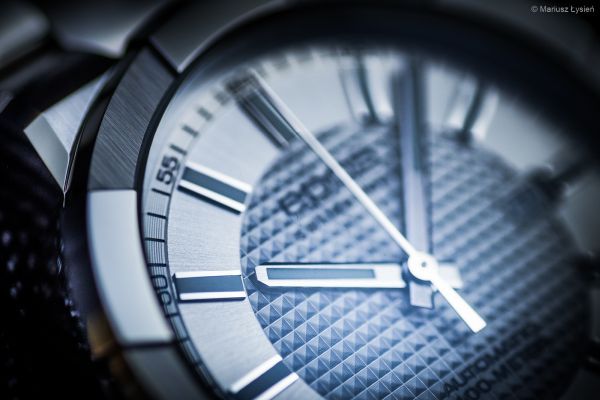Quartz vs Automatic – Which Watch is Better for You?
Choosing a watch is not just about the brand or design – it’s primarily about deciding on the mechanism that will power your timepiece. Quartz and automatic watches differ not only in how they operate but also in their purpose, maintenance costs, and prestige. Before selecting a specific model, it’s worth understanding the specifics of both options to determine which mechanism best suits your needs. Find out which choice is right for you.
Quartz or Automatic? Discover the Differences Between Watch Mechanisms
When deciding on a men's watch or a women’s model, you face an important technological choice. The fundamental difference lies in the power source and timekeeping precision. In this article, we’ll discuss the two most popular types of mechanisms.
- Quartz watches use a small crystal as the core of their mechanism, which generates highly accurate vibrations when powered by a battery. These vibrations ensure precise time measurement, with deviations of just a few seconds per month.
- In contrast, in automatic watches, the entire process is powered by kinetic energy generated by your wrist movements. The mainspring is wound gradually through rotor oscillations, eliminating the need for a battery. However, it’s important to note that an automatic mechanism requires regular wear – if left unused for several days, the watch will stop.
In summary, the differences between quartz and automatic watches are not only technical but also affect daily use and maintenance requirements.
Automatic vs Quartz – A Choice Tailored to Your Lifestyle
When deciding on the right mechanism, consider your lifestyle and daily activities. For active individuals, athletes, or those with a busy schedule, a quartz watch is often a better choice. It’s more resistant to shocks, doesn’t require daily wear, and offers greater accuracy. Travelers will appreciate how easy it is to adjust the time on a quartz watch when moving across time zones.
On the other hand, an automatic mechanism is perfect for those who value tradition, craftsmanship, and mechanical finesse. This is especially true if you see your watch not only as a tool for measuring time but also as a piece of jewelry or an expression of personal style. Keep in mind the maintenance aspect as well – a quartz watch requires periodic battery replacement, while an automatic model needs regular servicing, which tends to be more expensive.
Quartz and Automatic Mechanisms – Prestige and Value
When choosing between these two options, consider the long-term value of your investment. Automatic watches often retain or even increase their value over time, particularly those from renowned manufacturers. This is due to their mechanical complexity, traditional craftsmanship, and limited production. Quartz counterparts, despite their reliability, are rarely seen as collectibles. The prestige of owning an automatic watch comes from centuries of watchmaking tradition and the artistry involved in their creation. Each automatic mechanism is a miniature masterpiece, composed of hundreds of precisely synchronized components.
That said, prestige and potential collector’s value come with higher purchase and maintenance costs. If you’re looking for a practical and reliable timepiece without straining your budget, a quartz watch might be the better choice.
What to Consider for Maintenance? Hidden Costs of Different Watch Types
The durability and reliability of your watch largely depend on regular maintenance, which varies significantly depending on the mechanism. For quartz watches, the main cost is battery replacement, typically every 2-4 years, which is relatively inexpensive. However, remember to check the condition of the seals during each battery change to maintain the watch’s water resistance. On the other hand, automatic watches require more comprehensive care. A full servicing of an automatic mechanism should be performed every 3-5 years and involves higher costs, including cleaning, lubrication, and adjustment. Additionally, automatic watches are more susceptible to magnetic fields, which can disrupt the mechanism and require professional attention. Some brands also mandate servicing through authorized centers, further increasing maintenance expenses. Regardless of the mechanism, regular maintenance is essential for long-term, trouble-free use.
Which Mechanism Should You Choose to Start Your Watch Journey?
When starting your watch journey, the choice you make can influence your future collecting decisions. For beginners, a quartz mechanism can be an excellent introduction to the world of timepieces. It allows you to familiarize yourself with basic functions and get used to wearing a watch without worrying about winding or precise adjustments. This is especially important if you’re still shaping your preferences for style and functionality. As your passion develops and you gain a deeper understanding of the nuances of watchmaking, transitioning to an automatic watch becomes a natural step. However, there are no strict rules – everything depends on your personal preferences and budget. Many collectors successfully combine both automatic and quartz watches in their collections, appreciating the unique features of each mechanism. The key is finding a balance between practicality, aesthetics, and personal taste.
Looking for women's quartz watches or automatic versions (and more)? Then visit WestWatches online store and choose from hundreds of luxury products perfectly suited to your preferences and style. We look forward to your visit!
See popular articles

Dlaczego zmieniamy czas na zimowy w zegarkach? Tłumaczymy mechanizm i historię zmiany czasu
Dwa razy w roku cofamy lub przesuwamy wskazówki zegara, ale rzadko zastanawiasz się, po co właściwie jest zmiana czasu i dlaczego wciąż jej przestrzegamy. To nie tylko kwestia tradycji – za tym zwyczajem stoi historia, decyzje polityczne i próba lepszego wykorzystania światła dziennego. Sprawdź, jak działa mechanizm przestawienia czasu, skąd się wziął i jakie ma znaczenie dziś.

Zegarki solarne - ranking ciekawych modeli i wszystko co warto wiedzieć przed zakupem
Zegarki solarne to nowoczesne połączenie stylu i praktyczności – zasilane światłem, niezawodne i przyjazne środowisku. Dzięki wbudowanym panelom solarnym nie wymagają regularnej wymiany baterii, co czyni je wyjątkowo wygodnymi w codziennym użytkowaniu i bardziej ekologicznymi. W naszym rankingu znajdziesz modele, które wyróżniają się nie tylko atrakcyjnym designem, ale również bogatą funkcjonalnością i imponującą trwałością, idealne dla wymagających użytkowników poszukujących zegarka na lata.

Jak zmienić czas na zimowy w Casio G Shock?
Zmiana czasu potrafi zamieszać – nie tylko w głowie, ale i na nadgarstku. Jeśli nosisz G-Shocka i chcesz szybko przestawić go na czas zimowy, nie musisz zagłębiać się w instrukcje ani zgadywać, który przycisk za co odpowiada. W tym poradniku znajdziesz konkretne wskazówki, proste kroki i sprawdzone triki, które pomogą Ci bez nerwów ustawić zegarek Casio G-Shock – niezależnie od modelu, który masz.

Jak dobrać biżuterię do zegarka? Zasady, inspiracje i gotowe triki stylizacyjne
Dobranie biżuterii do zegarka to nie tylko kwestia gustu, ale przede wszystkim umiejętność stworzenia spójnej, stylowej całości. Zegarek może być subtelnym tłem dla dodatków albo główną ozdobą, wokół której budujesz cały look. Sprawdź, jak łączyć metale, wybierać bransoletki i tworzyć zestawienia, które zawsze wyglądają elegancko i nowocześnie.

Jaki zegarek na 40 urodziny wybrać? TOP 5 wyborów
Czterdzieste urodziny to wyjątkowy moment – symboliczny etap życia, w którym zegarek może stać się nie tylko praktycznym dodatkiem, ale także wyrazem stylu, statusu i osobowości. Zegarek na 40 urodziny powinien podkreślać dojrzały gust, elegancję oraz indywidualność obdarowanego – kluczowe znaczenie ma jakość, prestiż marki oraz funkcjonalność dopasowana do codziennych aktywności Poniżej przedstawiamy TOP 5 zegarków męskich na 40 urodziny dostępnych w ofercie sklepu WestWatches – zapraszamy!

Jaki zegarek kupić na dzień chłopaka? TOP 6 propozycji od West Watches
Dzień Chłopaka to świetna okazja, aby podarować coś wyjątkowego – prezent, który będzie nie tylko praktyczny, ale i symboliczny. Zegarek to zawsze trafiony wybór – elegancki, funkcjonalny i trwały. Ważne jednak, by dopasować go do stylu oraz trybu życia obdarowywanego. Czy woli klasyczną elegancję, sportowy look, a może nowoczesne technologie? Poniżej znajdziesz sześć propozycji z oferty WestWatches.pl, które sprawdzą się jako idealny prezent.

Czym jest bezel zegarka? Wyjaśniamy jego zastosowanie i zalety
Bezel to detal, który często umyka uwadze, a w rzeczywistości decyduje o funkcjonalności, stylu i bezpieczeństwie zegarka. To właśnie ten pierścień sprawia, że czasomierz staje się czymś więcej niż tylko ozdobą na nadgarstku. Dowiedz się, co to jest bezel w zegarku, jak działa i do czego możesz go wykorzystać na co dzień.

Tachometr - co to jest i jaką funkcję pełni w zegarku?
Tachometr w zegarku to coś więcej niż ozdobna skala na tarczy – to praktyczne narzędzie, które pozwala w kilka sekund obliczyć średnią prędkość na wybranym dystansie. Choć dziś korzystasz z GPS-u, ta klasyczna funkcja nadal ma swój urok i znaczenie, łącząc precyzję z historią zegarmistrzostwa.

Bransoleta mesh - czym jest i do jakich stylizacji pasuje?
Jeśli szukasz dodatku, który połączy wygodę codziennego noszenia z elegancją biżuterii, bransoleta mesh może być strzałem w dziesiątkę. Ten charakterystyczny, mediolański splot od lat zdobywa uznanie zarówno wśród miłośników klasycznych zegarków, jak i fanów nowoczesnych smartwatchy. Zanim zdecydujesz się na zakup, sprawdź, co dokładnie oznacza ten typ bransolety, jakie są opinie użytkowników i w jakich stylizacjach sprawdza się najlepiej.











